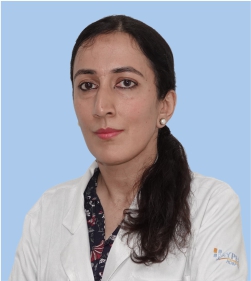Ear, nose, and throat allergies can be a complex challenge affecting your daily life. We delve into the causes, symptoms, and advanced treatments available to manage these conditions effectively. Discover the expert guidance of Dr. Manasi Mehra, whose approach in ENT gives patients hope and relief.
Identifying ENT Allergies
Identifying how ear, nose, and throat allergies manifest begins with a keen observation of symptoms. Sensations such as persistent itching, sneezing, congestion, and even hearing difficulties often signal a reaction. Each symptom, no matter how minor, offers a clue about what’s happening inside these critical body regions.
When allergens like pollen or dust come in contact with the nasal or throat tissues, they trigger an immune response. The body mistakenly identifies these harmless substances as threats, leading to a release of histamines. This release causes the classic allergic symptoms in the affected areas. The nose and throat swell because of increased blood flow, which results in congestion and irritation.
Additionally, allergy-induced inflammation can travel from the throat to the ears, obstructing the Eustachian tubes. This obstruction often leads to pressure changes and hearing issues, a common but less obvious allergy symptom. The ears may feel clogged, leading to dullness in hearing or mild earaches.
Recognizing the early signs of ENT allergies helps prevent the symptoms from becoming unmanageable. An itchy nose or eyes, frequent sneezing, and a blocked nose persisting beyond a cold often indicate an allergic reaction rather than a viral infection.
A professional diagnosis ensures the right treatment. Dr. Manasi Mehra is renowned for providing such diagnosis using a patient-friendly approach. Her experience and empathetic understanding of patient needs lay the foundation for effective management strategies.
When puzzling symptoms such as unexplained ear pressure or persistent itching in the throat occur, it’s crucial to consult a specialist. Early visits can make a significant difference in the management of symptoms. Dr. Mehra’s skillful evaluation of these conditions helps demystify what may be causing the distress.
For those who regularly experience allergies, Dr. Mehra offers trusted advice on managing them all year round. Her insights support patients in understanding their triggers and seeking relief promptly. By recognizing the unique ways allergies manifest in the ears, nose, and throat, patients and professionals alike can work together to enhance comfort and well-being.
Advanced Treatment Options
Exploring advanced treatment options for ear, nose, and throat allergies reveals a wide array of opportunities to enhance quality of life. With the integration of innovative techniques, medical therapies, and surgical interventions, managing ENT allergies has never been more promising. Dr. Manasi Mehra has been at the forefront, mastering minimally invasive procedures to provide tangible relief for patients.
Medical therapies often serve as the first line of defense. These might include antihistamines, nasal corticosteroids, and leukotriene receptor antagonists, all aiming to reduce inflammation and alleviate symptoms. However, when medications fall short, surgical options become critical.
Functional Endoscopic Sinus Surgery (FESS) is one such procedure that stands out. It is a minimally invasive technique allowing for the removal of obstructions and drainage of sinuses. By enhancing airflow and clearing passages, FESS significantly reduces the frequency and severity of infections. Patients often find improvements in breathing, reduced congestion, and a decrease in sinus-related headaches. Likewise, micro ear surgery is a precise option for addressing chronic ear conditions related to allergies. It corrects structural issues within the ear, alleviating auditory problems and minimizing infection risks.
The benefits of these surgeries are profound. Many patients express relief from long-standing discomfort and the freedom of experiencing normal senses. Jane, a patient of Dr. Mehra, shared, “After FESS, I breathe easily and sleep better. It’s a life-changing outcome.” Similarly, Sam noted after micro ear surgery, “The persistent ringing in my ears vanished. I regained clarity in my hearing.” These testimonials highlight the transformative potential of surgical interventions.
Incorporating advanced procedures not only eases allergic symptoms but also improves overall well-being. Minimally invasive techniques offer reduced recovery times and fewer complications compared to traditional surgery. Patients return to their daily lives quicker, free from the debilitating restraints of allergies.
To explore more on managing symptoms sustainably, including practical home treatments, visit the 10 powerful home treatments to ease sinus pressure and pain. These advances bridge a path to living well, underlining the importance of personalized medical advice from experts like Dr. Mehra.
Living Well with Allergies
Living with ear, nose, and throat allergies demands thoughtful environmental and lifestyle adjustments. Begin by considering environmental control. Keep your home free from common allergens like dust, pollen, and pet dander. Regular vacuuming with a HEPA filter and using an air purifier can substantially reduce indoor allergens. Reduce humidity levels to discourage mold growth and opt for hypoallergenic bedding to minimize dust mites.
Dietary changes also play a crucial role in managing ENT allergies. Incorporating anti-inflammatory foods, such as leafy greens, nuts, and fish rich in omega-3 fatty acids, can help alleviate symptoms. Some individuals benefit from removing potential trigger foods like dairy or gluten, which may exacerbate their conditions. Focus on drinking adequate water to maintain sinus and throat moisture, aiding in better mucus clearance.
Incorporating habits that curtail exposure to allergens is equally important. Showering and changing clothes after outdoor activities can limit pollen contact. If you’re prone to seasonal allergies, avoid outdoor activities on high pollen days. Nasal saline irrigation is a simple yet effective practice to clear allergens and reduce irritation in nasal passages.
Open communication with your healthcare provider, like Dr. Manasi Mehra, enables personalization of your approach to managing allergies. Discuss your unique triggers and responses to help adjust treatment plans. A healthcare professional can offer guidance tailored to your needs and may suggest allergy tests or additional interventions.
Maintaining an open dialogue is essential to stay informed about progressive treatments and lifestyle shifts that could enhance your well-being. Contact Dr. Mehra for further personalized consultation, using this link.
While these lifestyle adjustments make significant strides toward alleviating allergy symptoms, resources like expert advice can be invaluable. For more expert-driven insights, consider reading about managing seasonal allergies all year.
Your active engagement in conversation and informed decision-making sharpens your ability to live well with ENT allergies. By embracing these changes and maintaining an open line of communication with healthcare professionals, you can significantly enhance your overall allergy experience and daily comfort.
Final words
Understanding and effectively managing ear, nose, and throat allergies is essential for improving quality of life. With Dr. Manasi Mehra’s expert diagnosis and treatment options, patients can find relief and control over their conditions. Utilize these insights and reach out to experienced professionals like Dr. Mehra for personalized care and guidance.




